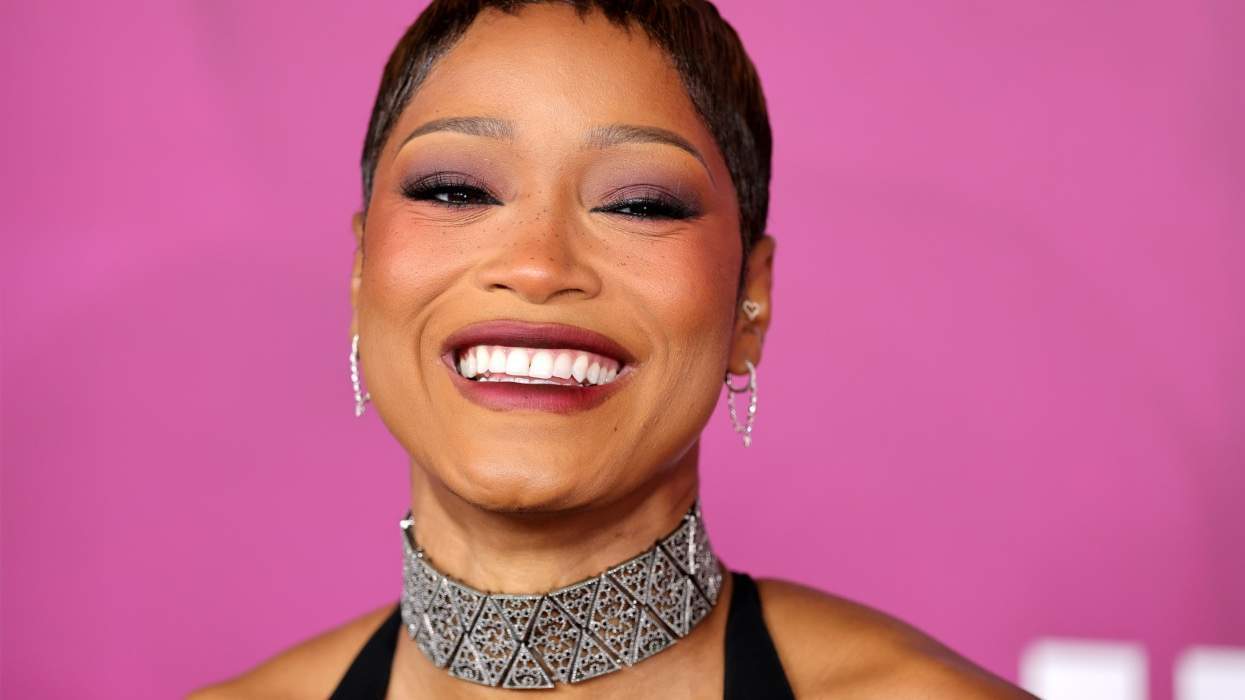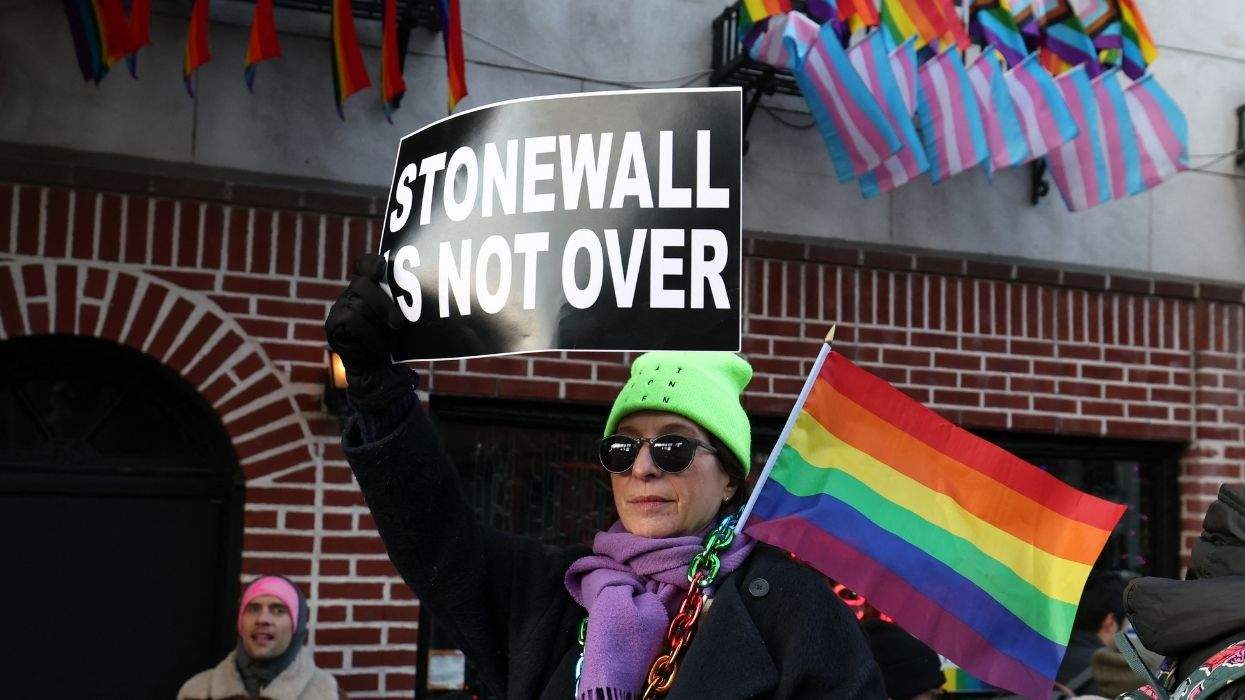It was a cool night in April 1997. I was walking down Hudson Street in lower Manhattan, a couple of blocks from where the gay and lesbian community center was then. I was also scared shitless.
It was my first foray into Manhattan since I'd begun presenting as a woman full-time, and I was on my way to the center to hear trans author and activist Riki Wilchins speak. Just weeks after I'd gone full-time, I'd read Riki's newly released book, Read My Lips: Sexual Subversion and the End of Gender, and I desperately wanted to know more. I needed to understand. I'd been gorging myself on information on what it is to be trans and what it means in the real world, but I hadn't even begun to make any real sense out of it all. Most of what I'd read and heard just led me to more questions. This night, I hoped, would bring some answers ... and it did, just not in the way I thought it would.
I was startled by a driver in a loud muscle car on the opposite side of the street who leaned out of his window. "Hey, f****t!" was all I heard about a half-second before a large alcohol bottle of some sort whizzed past my face, missing me by no more than a half an inch before smashing against the wall of the building I was walking past.
I heard the driver gun his motor, and I ran as hard and as fast as I could in the heeled boots I was still learning how to walk in. I rounded the corner of 13th Street and got about halfway to the center before I looked back and realized the driver was not pursuing me but had apparently just driven away after he'd thrown the bottle.
My heart was pounding, and I realized I was crying. I stood where I'd stopped running, sobbing and hugging myself for about 10 minutes, until the shaking stopped. As I walked the final distance to the center, I realized that I'd never been so terrified in my life.
A week later, I was in a chat room for trans women (chats and Yahoo email lists were our social media then) and I recounted what had happened. I'll never forget what a trans woman who was much further along in transition than I was said when I'd finished the story. "You want to know what it is to be a transsexual woman? This. Get used to it."
Truth is, the particular slur didn't matter. In 1997 "tranny" wasn't popularly considered to be a slur, though it was often used as one. The use of "shemale" was associated with the porn industry, and its use was seen by many trans women as the equivalent of being called a prostitute, which was seen as particularly offensive in light of the popular opinion of the time that the only reason any male-born person would dress as a woman was to entice obviously sick and perverted men to have sex with them for money.
What does matter is that my story is a very familiar one to trans women of a certain age. We came out as transgender and transsexual women at a time when we were legally protected against discrimination in very few areas of the United States, a time when it was perfectly legal and socially acceptable to deny us work, housing, and pretty much anything else just because we were trans.
We rarely reported incidents like mine to the police because it was considered a given that it was extremely unlikely the cops would do anything to help us or find our attackers but very likely that they'd find some reason to lock us up or otherwise make us regret interacting with them.
"f****t." "Tranny." "Shemale." These were the epithets we heard as the most terrifying moments of our lives were happening. In many tragic cases, they were the last words a trans woman heard before her life was brutally snuffed out. When we heard these words shouted in our direction, we knew something horrible was likely to happen next.
When trans women of my age hear these words today, we remember the fear. We remember the terror of being young, afraid, of knowing someone was out to hurt us and no one was likely to help us or even care if they did.
When RuPaul uses these words on television, we see it as evidence not of progress but rather of how very far we still have to go. It's about more than simply taking offense at improper word usage, it's about a gut reaction that's as ingrained in us as a veteran's hitting the deck when they hear an unexpected firecracker go off.
These words do real and tangible harm to people who don't deserve it, trans women who have been though enough struggle and fear in our lives, thank you very much, and we sure as hell don't need this jerk making them harder than they have to be.
And the fact that RuPaul and Logo could easily put an end to this right now but are instead choosing to continue hurting trans women unnecessarily, for money? It's pretty easy to understand why trans women feel the way we do about this and about RuPaul. It's why we absolutely must win this battle and why we must unite as a community to say that this is not OK.
Are we, the modern LGBT community, really OK with the lack of respect RuPaul and Logo are showing to trans women by refusing to stop using these words? Are we really OK with companies and organizations that continue to promote a host and show that exhibits such disdain and disrespect to trans women?
Are we the kind of LGBT community that will look the other way when it's a popular gay celebrity harming our most victimized and vulnerable, or are we a community that will stand together and insist on respect and equality for everyone within it?
These are the questions I think we must ask ourselves and those who claim to be our allies. They must particularly be asked of those like RuPaul and Logo, who claim to support and promote the LGBT community but in reality seek only to market to it, profiteers focused solely on drawing the largest possible paycheck for themselves, no matter who happens to be harmed in the process.
I'd like to hope I already know the answers to those questions, but the truth is that only time will tell.
Nontrans queers, queens, we need your help on this. You keep this guy and his show in business. We need you to help us make these people stop hurting us. We need you to stand with us and insist that the antitrans slurs stop.
Any performer who's come as far as RuPaul has in the entertainment industry can do his thing without relying on these words. RuPaul and Logo have made it quite clear that they're not going to listen to the voices of trans women like me who have been calling them out on this for years.
They'll listen to you, though. You're their audience, not us. We need you to stand with us and let RuPaul and Logo know that you don't need to hear offensive slurs to enjoy his show and you're not comfortable with their use.
If you consider yourself a trans ally and supporter, here's your chance to put those values into action.
Please.
REBECCA JURO is a journalist and radio host. Her work has been published by The Bilerico Project, Washington Blade, and Gay City News. The Rebecca Juro Show streams live Thursdays from 7 to 9 p.m. Eastern.















